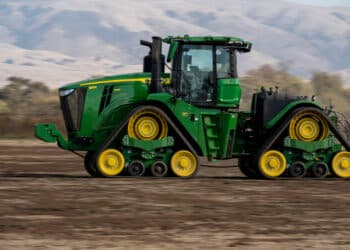Farmer sentiment spiked in November as post-election optimism mirrored 2016, as farmers anticipate that favorable estate taxes and regulations will continue under the new administration.
Purdue University’s Ag Economy Barometer hit 145, its highest value since May 2021, according to Michael Langemeier, associate director at the Center for Commercial Agriculture at Purdue University, which released the Ag Barometer on Dec. 3. The index, conducted Nov. 11 through Nov. 15, surveys 400 farm producers. The index’s 30-point is comparable to the 24-point jump between October 2016 and November 2016, following President-elect Donald Trump’s first election, Langemeier said.

The index shot up nearly 61 points between October 2016 and February 2017, signaling that more positivity could be on the horizon, he said.
Returning tariff, regulatory trends
Part of the improvement in farmer sentiment following the 2024 election is the expectation that policies of the first Trump administration will continue or return, Titan Machinery Chief Executive Bryan Knutson said during the company’s Nov. 26 earnings call.
During Trump’s first term, he subsidized growers for some of the “retaliatory impacts from the tariffs that hit on the commodity prices,” he said. That “played out quite well overall for the growers and for the equipment dealers.”
His customers are also looking forward to reinstatement of the Tax Cuts and Jobs Act, which provides 100% bonus depreciation, Knutson said.
Of respondents to the survey, 42% expected a trade war because tariffs on several countries, which Trump has promised, will significantly decrease U.S. agricultural exports, Langemeier said.

In addition, the expectation that increased estate tax limits enacted in 2017 won’t be rolled back also improved the outlook for farmers, Purdue’s Langemeier said.
“There were some concerns in the ag community that, if the Harris administration was elected, that those are going to be reduced,” he said. “They still could be reduced, as that’s a congressional decision, but there was a sigh of relief with respect to regulations and estate taxes and so that that’s at least part of the reason why this sentiment improved so much.”


Farm equipment purchases
Meanwhile, the desire to buy farm equipment improved slightly in November, according to the survey.

Fifty-one percent of farmers expect farm machinery purchases to be less likely next year compared to a year ago, down compared with the 2024 peak of 69% in September, but improved from 55% in October, according to the Center for Commercial Agriculture. Meanwhile, 8% of farmers have higher purchase expectations, tied with February for the highest value of the year, and up compared with 6% in October.
The Farm Capital Investment Index, which tracks farmers’ willingness to make large farm purchases, improved to 55, up 13 points year over year and two points below February 2016. Dealers, including Titan Machinery, have seen increased customer traffic, Knutson said.

“In the near term, we definitely are seeing some more positive sentiment or a brief uptick here and an increase in foot traffic, generally because yields broadly speaking across the U.S. footprint came in better than expected,” he said.
Over the long term, Titan expects reduced commodity prices, elevated costs, and higher interest rates to remain concerns, Knutson and Langemeier agreed.

The third annual Equipment Finance Connect at the JW Marriott Nashville in Nashville, Tenn., on May 14-15, 2025, is the only event that brings together equipment dealers and lenders to share insights, attend discussions on crucial industry topics and network with peers. Learn more about the event and register here.









